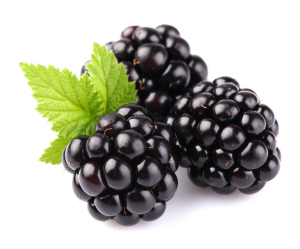Blackberry

Contents
Uses
- Sweet and juicy blackberries are more than just a tasty treat; they’re also full of beneficial nutrients and phytochemicals that boost your health. You can incorporate blackberries into your daily diet by tossing them into oatmeal, yogurt or salads, and they make a satisfying snack all on their own.
- Blackberries are low in calories and high in nutrition, so they’re an excellent part of any weight-loss strategy. One cup of fresh blackberries has just 62 calories and provides 30.2 milligrams of vitamin C. A cup of blackberries also has 7.6 grams of fiber, which helps induce feelings of satiety so you don’t get hungry again right after eating. Other nutrients found in blackberries include manganese, vitamin K and folate. Because they are sweet, blackberries can be used as a healthy dessert alternative when you’re on a diet. They’re also low in sodium, so they’re perfect for people on salt-restricted meal plans.
Benefits
- Much like spinach, raisins, apples, plums and grapes, blackberries are rich in bioflavonoids and Vitamin C, but other nutritional benefits include a very low sodium count and having only 62 calories to a cup.
- The dark blue colour ensures blackberries have one of the highest antioxidant levels of all fruits. Antioxidants, well-known for lowering the risk of a number of cancers, are a huge bonus, but be aware the berries are best consumed in their natural state to get the full benefits.
- Consumption of blackberries can help to promote the healthy tightening of tissue, which is a great non-surgical procedure to make skin look younger. Prolonged consumption also helps keeps your brain alert, thereby maintaining clarity of thought and good memory.
- The high tannin content of blackberries provides a number of benefits to reduce intestinal inflammation, alleviate hemorrhoids and soothe the effects of diarrhea.
- Traditionally, the leaves and barks of the plant have also been consumed. The leaves of blackberries have been used to treat mild inflammation of the gums and sometimes even sore throats.
- The astringent tannins are effective in oral hygiene when used as a gargle or mouthwash.
- The leaves can also be used in a refreshing cup of tea or enhanced as a therapeutic drink. Not everyone will like the flavor, so to mask the bitter taste, honey or another form of sweetener may be added.
- The healthy dose of Vitamin K aids in muscle relaxing, so some women use the berries to alleviate labor pains. As part of a regular diet, the juice can also be used to regulate menstruation as it is very effective in helping blood to clot.
Cautions
- Blackberry is safe in amounts used as food. There isn’t enough information available to know if blackberry is safe in the larger amounts used as medicine.
Interactions
There is currently no information for blackberry interactions.
Other Names
Black Berry, Bramble, Dewberry, Feuilles de Mûrier, Feuilles de Ronce, Goutberry, Mûre, Mûre Sauvage, Mûrier, Ronce du Canada, Ronce Commune, Ronce Laciniée, Rubi Fruticosi Folium, Rubi Fruticosi Radix, Rubus affinis, Rubus canadensis, Rubus fruticosus, Rubus laciniatus, Rubus millspaughii, Rubus plicatus, Thimbleberry, Zarzamora.
References
Source: WebMD, http://www.webmd.com/vitamins-supplements/
Source:Huffing Post Canada, http://www.huffingtonpost.ca/2013/01/31/blackberry-facts_n_2581622.html
Source: Livestrong, http://www.livestrong.com/article/233747-what-are-the-benefits-of-blackberry-fruit/
